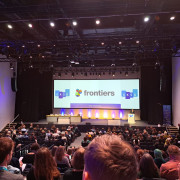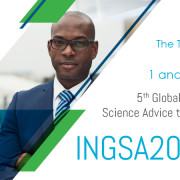- Science News
- Environment
- We need Open Science for Sustainability
We need Open Science for Sustainability
– By Kamila Markram, Co-founder and CEO, Frontiers
Frontiers scientists from around the world talk about current global issues and how industry and research need to work together to build a sustainable future — through Open Science.
Science and technology drive modern society. Ever since the scientific revolution, we have been using scientific discovery and inventions to reach new shores, create wealth, provide food and shelter for a growing population, keep us alive longer, in better health, and more recently, to connect and communicate on a global scale.
Science drives growth
The last 200 years saw an explosion in innovation and discovery, forming the basis of our modern life, allowing us to prosper and the population to grow: electricity, the steam engine, modern chemistry, the internal combustion engine, jet aircraft, and since the 1940’s, modern digital computation, which changed the way we work, communicate and connect with each other. All these scientific advancements pushed and accelerated the world economy to over USD 73 trillion in 2015.
Today, we are at the dawn of the fourth industrial revolution: advancements in biology are merging with technology to give us 3D printed organs, allowing us to edit our genetic code and helping to eradicate disease. The Internet of Things currently connects 15 billion devices to the Internet and will grow to over 50 billion devices by 2020, from electricity grids to roads and health care systems.
The unique knowledge network scientists have created has driven unprecedented and ongoing exponential improvements in public health, food production, industrial productivity, communications and education. There has never been more of us and we have never been wealthier, healthier, more educated than we are today.
We are entering the Anthropocene
We are now a population of 7.4 billion people – approaching 10 billion by 2050. A population that needs to be fed, has growing energy needs, consumes, pollutes and pushes us into the era of the Anthropocene – the first period in the history of the planet in which a single species has placed basic earth systems and itself in danger.
We rely on fossil fuels as our main energy source for manufacturing, heating and transport. CO2 emissions have spiked exponentially over the last 50 years and are changing the climate in potentially irreversible ways, leading to increasingly frequent extreme weather events, desertification and rising sea levels.
As agriculture needs to keep up with an increasing demand for food, fresh water is becoming a scarce resource in parts of the world. Unsurprising when we consider that it requires 1,600 liters of water to make 1kg of bread or 16,000 liters of water to produce 1 kg of beef. Forests and grasslands are systematically destroyed. Overfishing is depleting our oceans and pollution leads to acidification, whipping out coral reefs oceans-wide. Scientists have declared this the era of the 6th mass extinction: we are rapidly and irreversibly losing large proportions of amphibians, birds and mammals due to human destruction of their biosphere.
The demand for accelerated growth is stressing the ethics of all supply chains. Pollution and climate change have a very real impact on traditional economies and social structures: social and political instability, rapidly rising economic inequality, unsettled societies and mass migration.
We face an existential crisis. Rising to this challenge requires a decisive push towards a sustainable society.
Forging a path with science towards a sustainable future
What do we need to do? International agreements and national policies, re-orientation of companies and public institutions towards sustainable products and services and profound changes in individual behavior are vital. But even if we achieve all of this – problems are recognized and there is a political, industrial and social will to address them, these solutions can take decades to implement – witness the forty years of debate on climate change. We are in a race against time. The solutions can ultimately only come from science – new science.
Scientists have not been idle – in fact they are delivering effective solutions. Their efforts have resulted in the highly effective Montreal Convention on ozone-depleting gases, wind turbines, organic solar cells and alternative biofuels that are transforming prospects for renewable energy. They work on solutions to grow more crop on less land – without having to use harmful pesticides and fertilizers. They build net zero energy buildings, invent bio-degradable plastics, and innovate on how to recycle greenhouses gases. And they address how to change individual behaviour using the latest technologies, such as virtual reality simulations.
Yet much more needs be done. Faced with exponentially growing problems, we need exponential growth in solutions – the sort of growth we have seen in IT and in biotech. To date, this kind of growth has not been forthcoming. We suggest that the answer lies in the infrastructure, the knowledge networks, the plumbing that makes the scientific enterprise tick, the machinery that allows science to evolve.
Restricted and selective access to science delays knowledge and solutions
Today, much of science is still exclusive and restrictive. Seven million scientists spend ~$2.3 trillion to generate new science and publish over 2 million scientific articles – every year. Unfortunately, over 80% of these scientific articles are locked up behind paywalls, where they are inaccessible to society, including many scientists. Not even the best and richest universities can afford to buy access to all ~30’000 scholarly journals.
To make matters worse, journals cherry-pick the research they want to publish, distorting research priorities and delaying the availability of potentially vital scientific breakthroughs. Scientists seeking to publish their work are forced to submit to journal after journal, delaying at least 1 million papers every year, and wasting ~500,000 person-years of scientists’ time.
Our scientific infrastructure for scholarly publishing is outdated. It doesn’t suit the sustainability crisis we are facing where our rate of consumption already far exceeds our rate of replenishment and repair. Today’s science is a network phenomenon and delaying or restricting access to even one discovery could delay all of science and consequently the sustainable solutions we so urgently need. To produce the solutions, we need to reenergize our infrastructure with new ways of publishing science.
Open Science is the science of the future
This new infrastructure is Open Science and in particular Open Access publishing. Open Science means that all data, tools and protocols are freely shared between scientists and with the larger public. Open Access (OA) publishing in particular means that scientific articles are shared freely with the entire world. The first successful open-access publishers, including BioMed Central and the Public Library of Science (PLOS), both founded in 2000, developed a new business model in which academic institutions pay for their researchers’ articles to be published online, thereby granting open access to the latest research to anyone with access to the internet.
The OA movement gained momentum in 2002, when the Budapest Open Access Initiative was released, publishing the principles of open access, with subsequent advancements including the Bethesda Statement on Open Access Publishing, the Berlin Declaration on Open Access to Knowledge in the Sciences and Humanities, and in 2005, the UK-based Wellcome Trust, requiring all Wellcome-funded research to be published as open access. A number of government initiatives have also been introduced over the years, and cumulated most recently in 2016, then Europe’s ministers of science, innovation, trade and industry, published a progressive commitment calling for full open access to scientific research by 2020.
In 20 years, the Open Access movement has succeeded in making ~20% of newly published articles freely accessible. This is an amazing achievement by many visionary people and organisations. But it is not enough. Still today, if we had to pay publishers to make all their articles immediately accessible, we would have to pay $10 billion each year, and the problem of delay would remain.
Imagine how much more innovation, how much more economic prosperity and how many more solutions to our sustainability crisis could be generated if we had free and efficient access to all our scientific knowledge.
Open Access – taken to the next level through Internet technology
At Frontiers, we believe that sustainability challenges can be tackled far more quickly and efficiently when the solutions to those challenges are flowing – once we have fully transitioned to Open Science, powered by advanced IT.
Born digital in 2007, Frontiers aimed to take open access to the next level – not only making papers open and accessible for all to read, but directly tackling the deep seated problems in the scientific publishing infrastructure – quality, impact, bias and delays. We leverage cutting-edge technology to massively improve speed and efficiency and new publishing policies based on transparency and accountability to eliminate bias while simultaneously safeguarding scientific quality. At the heart of our technology is our collaborative peer-review platform where real-time interactions between editors, reviewers and authors are facilitated and enhanced with smart algorithms. This means we publish all valid science, quickly and efficiently.
Our solution is heavily based on technology. Our editorial board of ~70’000 researchers from top institutions worldwide are empowered by virtual editorial offices and assisted by thousands of software workflows and algorithms that suggest the best suited reviewers for articles, flag potential issues, and facilitate decision-making at critical time-points. Post-publication, online profiles for our authors, editors and reviewers, acknowledge their contributions and achievements and enhance their visibility and our algorithms ensure that articles are disseminated in a customised way. Consequently, Frontiers journals achieve high readership: articles receive over 6 million views and 2 million downloads each month and this translates into some of the highest citation rates for our journals in their fields.
We are convinced that scientists must benefit from the enormous advances in IT and need to be empowered in the dissemination and communication of their scientific output. But we are painfully aware that all we are doing at Frontiers is a drop in the ocean. We need to do much more and we need to do it together – with the scientific community, Open Science and Open Access organisations & publishers and with policy makers and research funding agencies – and ultimately also companies that can translate scientists’ discoveries into competitive products.
Enabling scientific communities to solve today’s problems – faster
More than ever, science and technology are needed to engineer solutions to move us towards a sustainable society. But for this to happen, scientists need to become far more involved in the sustainability discussion, and their research results need to be openly and freely accessible to other researchers and industries.
With Open Science, every scientific discovery, every new technology can become a building block for further innovation. Open science allows us to leverage global scientific output and the collective intelligence of scientific communities to combine innovations in unimaginable ways, generating new discoveries, new technologies and new sustainability solutions.
This is the new infrastructure for scientific publishing and dissemination that we need as we face exponentially growing sustainability challenges. Many of the scientific solutions are already out there, but they need to be rapidly and freely available to others: policymakers to drive global decisions, companies to translate them into competitive products and scientists to build on each other’s insights and catalyze further solutions.
Science builds on science. Open science can and will accelerate all the solutions we so urgently need to build a sustainable future.







